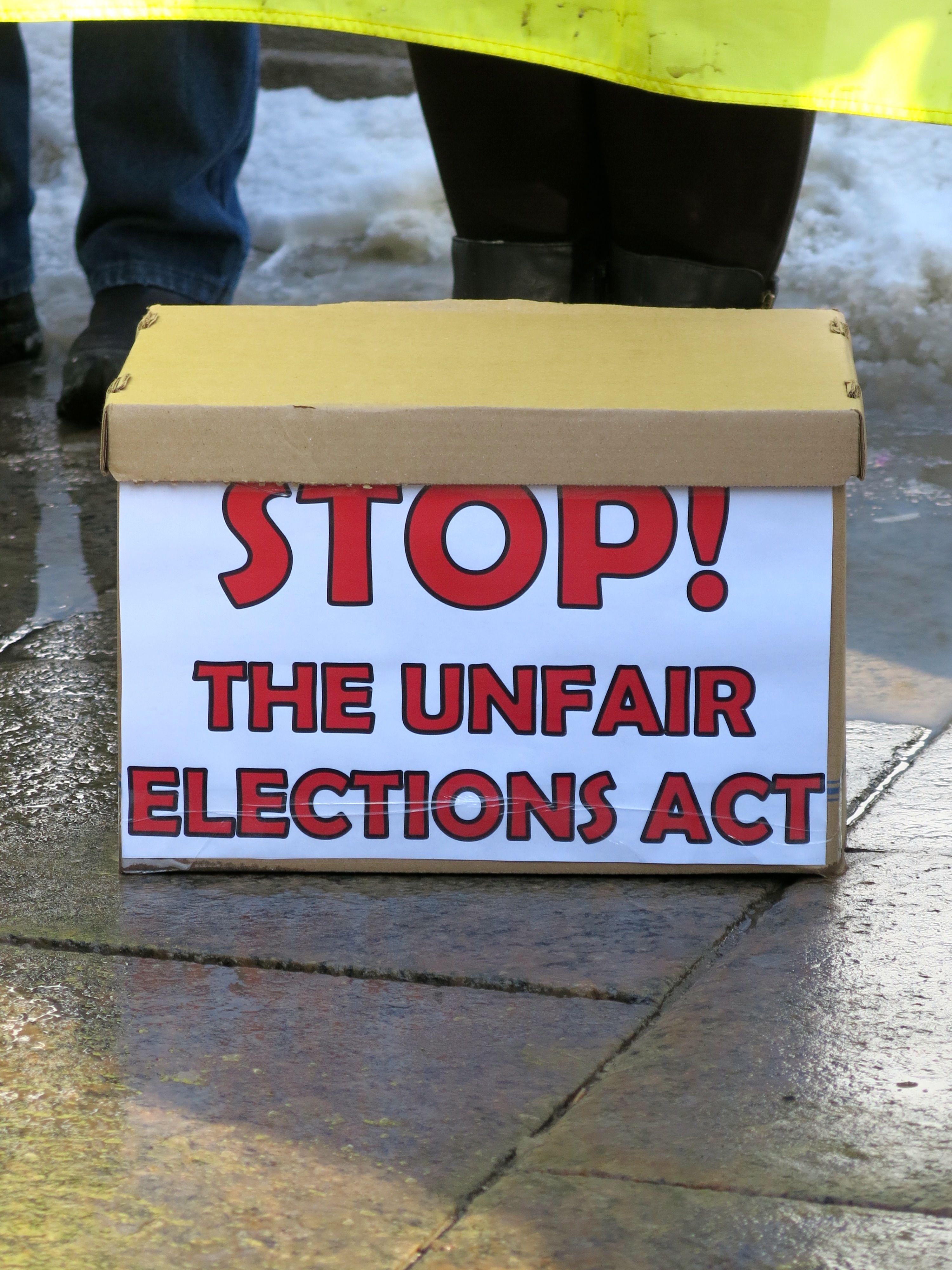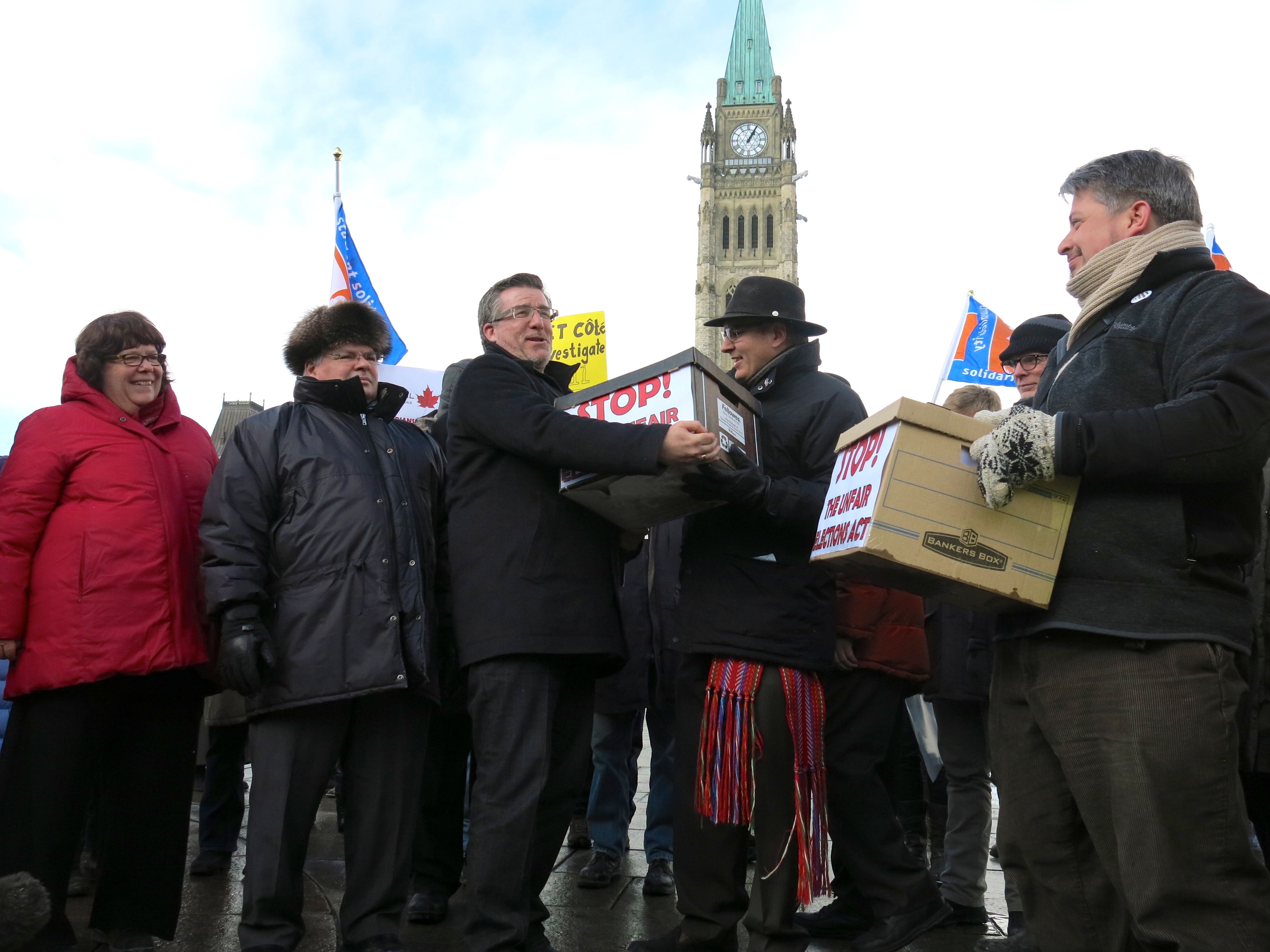The Council of Canadians and the Canadian Federation of Students (CFS) today presented Toronto-Danforth Member of Parliament Craig Scott with two boxes containing over 30,000 petitions that were signed by Canadians over the weekend. The petitions oppose the Fair Elections Act, introduced in the House of Commons last week by Conservative MP Pierre Poilievre.
The petition calls on the government to, “table electoral reform legislation that incorporates the recommendations of Elections Canada, establishes enforceable standards for the conduct of political parties, enhances the ability of individual voters to challenge election results that have been obtained through ‘fraud or corrupt or illegal practices’, and protects voters from being victimized by election fraud again.”
The Council of Canadians and the CFS also today organized a “Hold the phone” action, asking Canadians across the country to engage in a synchronized call-in to Conservative MPs to voice opposition to the Act.
LeadNow.ca, which is also collecting signatures on a petition opposing the Fair Elections Act, reports as of this afternoon to have more than 30,000 signatures as well.
The flurry of popular response came after the surprise introduction of the Fair Elections Act on February 4, and the indication that the Harper Conservatives are trying to rush their 242-page election law through Parliament with minimal debate or expert testimony, and with little, if any consultation with Elections Canada having taken place before the release of the document.

Called an “affront to democracy” by Chief Electoral Officer Marc Mayrand on CBC’s The House over the weekend, the Council of Canadians notes that it opposes the Act for the following reasons:
– Fails to give the Commissioner of Elections the authority to compel witnesses to give evidence. Commissioner Yves Cote has said that his inability to legally compel witnesses was hampering the investigation of more than 1,400 complaints about false or misleading telephone calls to electors in the 2011 election.
– Denies election officials the investigative power to compel political parties and their riding associations to provide financial documentation to support their financial returns.
– Fails to hold political parties to account for the authorized use of its data base by those who have access to it.
– Requires the Commissioner to inform a politician in writing if they are to be investigated for a breach of election laws, a statutory heads-up not provided to anyone else in broader society.
– Muzzles the Chief Electoral Officer from making allegations of electoral fraud public.
– Shifts the appointment of the Commissioner of Elections from the Chief Electoral Officer to a federal civil servant.
– Raises the limits on political donations by 25 per cent, from $1200 to $1500. This benefits the Conservative party who have more big donors who give the maximum amount.
– Increases the election-spending limits for each party by 5 per cent, which was about $21 million in the last election.
– Stops voters from using the voter card sent out by Elections Canada as valid ID. This could mean that some Indigenous people, young people, seniors, homeless, even those without a drivers licence, may not be able to exercise their right to vote.
– Forbids Elections Canada from launching ad campaigns to encourage people to vote.
“The Unfair Elections Act aims to suppress the vote of groups that may not vote Conservative including students, Indigenous people, seniors, and people on low-incomes by eliminating the vouching system,” said Jessica McCormick, National Chairperson of the Canadian Federation of Students. “The Chief Electoral Officer should be given more scope, not less, to encourage Canadians to vote. Dropping voting rates are not an excuse to strip the office of this function –- it’s a reason to bolster this role.”
The Council’s Maude Barlow argues that a Fair Elections Act requires a fair parliamentary process and public consultation. This bill fails both those measures.
“The Unfair Elections Act does nothing to bring to justice the people behind the widespread election fraud in 2011 and would actually make it harder to catch perpetrators of election fraud like Pierre Poutine,” said Barlow, National Chairperson of the Council of Canadians. “Canadians have the right to know when election fraud has been reported and if it is being investigated. That fact that this bill would prevent that is deeply troubling.”
LeadNow.ca summarizes their concerns as follows: “It boils down to this: instead of giving the people who investigate election fraud the power to compel testimony — the key power Elections Canada has needed to get to the bottom of the robocall scandal — this new election law would make it harder for young people, Aboriginal people and low-income people to vote. Incredibly, the misleadingly named “Fair Election Law” would even make it illegal for Elections Canada to promote voting.”
Craig Scott, who is the NDP critic for Democratic Reform, condemned the process by which the Act has been introduced, and has asked the Conservatives to engage in cross-country hearings on the Fair Elections Act. The petitions presented to Scott today will be formally tabled in Parliament.




